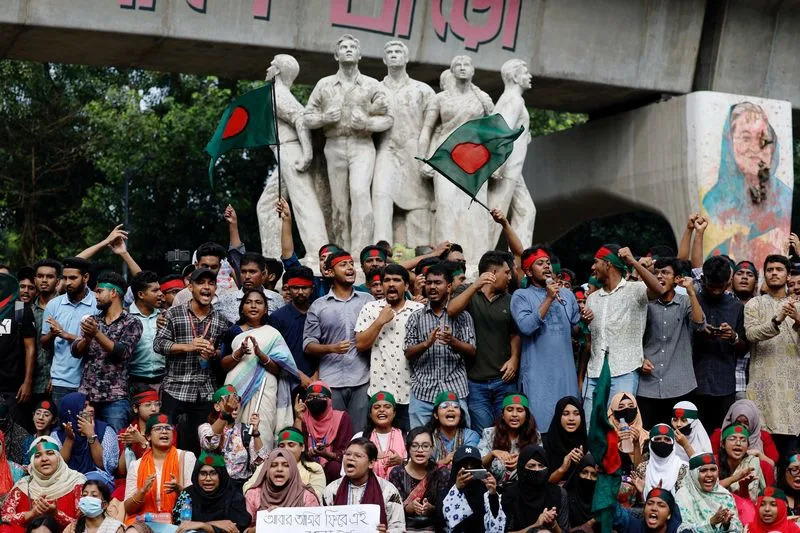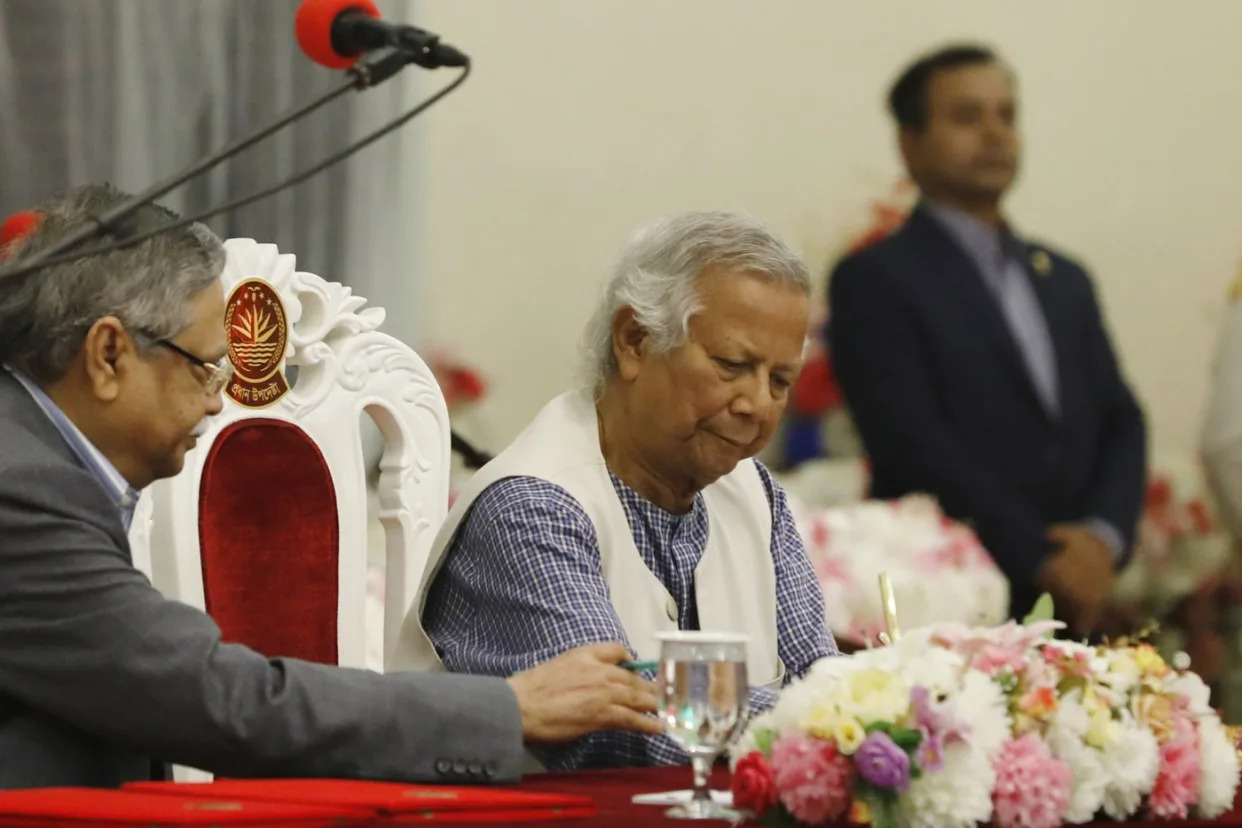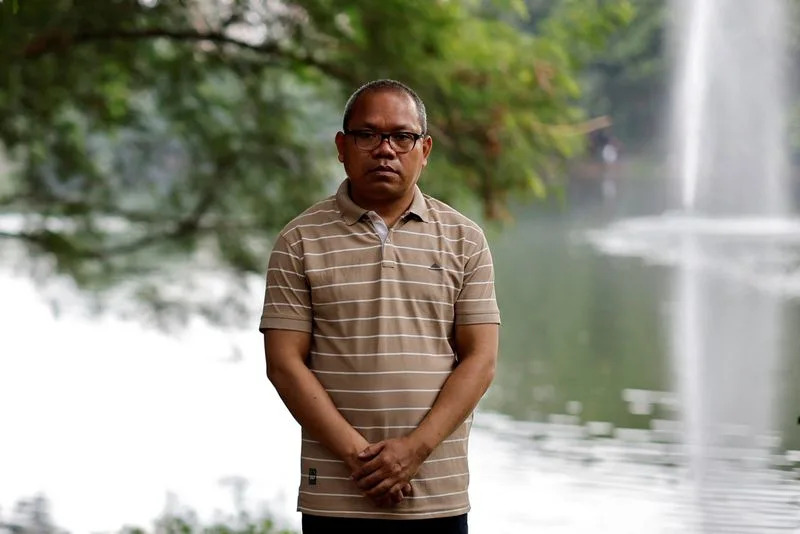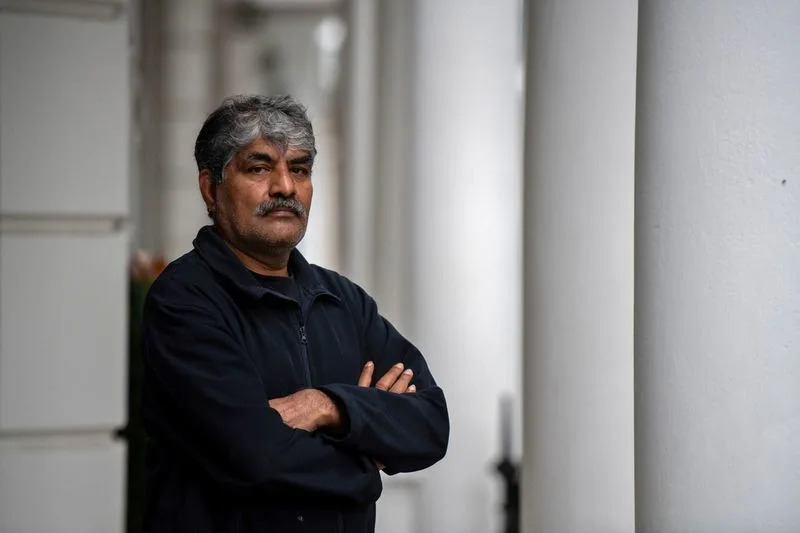
FILE PHOTO: Activists protest against Bangladeshi former PM Hasina at University of Dhaka's TSC, in Dhaka
Fri, August 30, 2024
By Ruma Paul
DHAKA (Reuters) - The United Nations Human Rights Office on Friday said it will dispatch a fact-finding mission to Bangladesh, as requested by the interim government, to investigate alleged human rights violations during recent deadly violence in the country.
Last month's anti-government protests, which began as a student-led movement against public sector job quotas, escalated into the deadliest violence since the country's independence in 1971.
The unrest left more than 1,000 people dead and prompted Prime Minister Sheikh Hasina to resign and flee to India on Aug. 5. Violence continued for some days after she fled.
An interim government led by Nobel Peace Prize laureate Muhammad Yunus replaced Hasina's administration, helping quell the violence as security forces also cracked down on protests.
"The office will deploy a fact-finding team to Bangladesh in the coming weeks, with a view to reporting on violations and abuses perpetrated during the protests, analysing root causes, and making recommendations to advance justice and accountability and for longer-term reforms," Ravina Shamdasani, spokesperson for the UN Human Rights Office, said in a statement.
This decision follows a visit by a UN team from Aug. 22-29, during which they engaged with various stakeholders, including members of the interim government.
UN High Commissioner for Human Rights Volker Türk welcomed Bangladesh’s recent accession to the International Convention for the Protection of All Persons from Enforced Disappearance, and praised the establishment of a national commission to investigate cases of enforced disappearances, a longstanding issue in Bangladesh.
"We stand ready to support the Commission in its work, which should be in close consultation with victims and their families," Shamdasani said.
(Reporting by Ruma Paul; Editing by David Holmes)
UN to deploy team to Bangladesh to probe rights abuses, violations during mass uprising
By Ruma Paul
DHAKA (Reuters) - The United Nations Human Rights Office on Friday said it will dispatch a fact-finding mission to Bangladesh, as requested by the interim government, to investigate alleged human rights violations during recent deadly violence in the country.
Last month's anti-government protests, which began as a student-led movement against public sector job quotas, escalated into the deadliest violence since the country's independence in 1971.
The unrest left more than 1,000 people dead and prompted Prime Minister Sheikh Hasina to resign and flee to India on Aug. 5. Violence continued for some days after she fled.
An interim government led by Nobel Peace Prize laureate Muhammad Yunus replaced Hasina's administration, helping quell the violence as security forces also cracked down on protests.
"The office will deploy a fact-finding team to Bangladesh in the coming weeks, with a view to reporting on violations and abuses perpetrated during the protests, analysing root causes, and making recommendations to advance justice and accountability and for longer-term reforms," Ravina Shamdasani, spokesperson for the UN Human Rights Office, said in a statement.
This decision follows a visit by a UN team from Aug. 22-29, during which they engaged with various stakeholders, including members of the interim government.
UN High Commissioner for Human Rights Volker Türk welcomed Bangladesh’s recent accession to the International Convention for the Protection of All Persons from Enforced Disappearance, and praised the establishment of a national commission to investigate cases of enforced disappearances, a longstanding issue in Bangladesh.
"We stand ready to support the Commission in its work, which should be in close consultation with victims and their families," Shamdasani said.
(Reporting by Ruma Paul; Editing by David Holmes)
UN to deploy team to Bangladesh to probe rights abuses, violations during mass uprising
Fri, August 30, 2024
GENEVA (AP) — The U.N. human rights office said Friday that it will deploy a fact-finding team to Bangladesh to investigate alleged rights abuses and violations through use of excessive force by security forces to quell protests led by students against the former government this summer.
The office of the U.N. High Commissioner for Human Rights Volker Türk said he had received an invitation from the country's interim leader Muhammad Yunus, to send the team to Bangladesh. The visit is set to take place in coming weeks.
Yunus, a Nobel Peace Prize laureate, took over this month as head of the government after former Prime Minister Sheikh Hasina stepped down and fled the country to India amid a mass uprising.
The United Nations has reported nearly 650 people died since July 15 when the student protests turned violent, and the figures also covered the deaths of many in new violence after Hasina left the country on Aug. 5.
A U.N. advance team visited Bangladesh over the last week and met with student leaders of the protests, including some who had been detained, as well as interim government and police officials, journalists, rights defenders and others.
The team received commitments from authorities and security for their “full cooperation” with the team's work, the rights office said.
“The U.N. human rights office looks forward to supporting the interim government and people of Bangladesh at this pivotal moment to revitalize democracy, seek accountability and reconciliation, and advance human rights for all the people in Bangladesh," the rights office said in a statement.
The Associated Press
Bangladesh's government led by Yunus signs UN convention involving enforced disappearance
GENEVA (AP) — The U.N. human rights office said Friday that it will deploy a fact-finding team to Bangladesh to investigate alleged rights abuses and violations through use of excessive force by security forces to quell protests led by students against the former government this summer.
The office of the U.N. High Commissioner for Human Rights Volker Türk said he had received an invitation from the country's interim leader Muhammad Yunus, to send the team to Bangladesh. The visit is set to take place in coming weeks.
Yunus, a Nobel Peace Prize laureate, took over this month as head of the government after former Prime Minister Sheikh Hasina stepped down and fled the country to India amid a mass uprising.
The United Nations has reported nearly 650 people died since July 15 when the student protests turned violent, and the figures also covered the deaths of many in new violence after Hasina left the country on Aug. 5.
A U.N. advance team visited Bangladesh over the last week and met with student leaders of the protests, including some who had been detained, as well as interim government and police officials, journalists, rights defenders and others.
The team received commitments from authorities and security for their “full cooperation” with the team's work, the rights office said.
“The U.N. human rights office looks forward to supporting the interim government and people of Bangladesh at this pivotal moment to revitalize democracy, seek accountability and reconciliation, and advance human rights for all the people in Bangladesh," the rights office said in a statement.
The Associated Press
Bangladesh's government led by Yunus signs UN convention involving enforced disappearance
Julhas Alam
Thu, August 29, 2024

DHAKA, Bangladesh (AP) — Bangladesh’s interim government on Thursday signed the instrument of accession to an international convention of the United Nations aiming at preventing enforced disappearances as a state party, authorities said.
Nobel laureate Muhammad Yunus, who took over this month as head of the government after former Prime Minister Sheikh Hasina stepped down and fled the country to India amid a mass uprising, signed the accession to the International Convention for the Protection of All Persons from Enforced Disappearances, his press department said in a statement.
The signing took place during a weekly meeting of the interim government’s advisory council amid applause from the council members, the statement said.
“It is a historic occasion,” Yunus was quoted as saying.
The move came just one day before the International Day of the Victims of Enforced Disappearances. There have long been accusations that during Hasina’s 15-year-rule, hundreds of Bangladeshis, including critics and opposition activists, became the victims of enforced disappearances.
Earlier this week, the interim government established a commission to investigate cases of enforced disappearances during Hasina’s rule since 2009.
New York-based group Human Rights Watch, in a letter to Yunus, said that according to Bangladeshi human rights monitors, security forces carried out more than 600 enforced disappearances since 2009. While some people were later released, produced in court or said to have died during armed exchanges with security forces, nearly 100 people still remain disappeared.
The group also said that leaked information from military intelligence records indicates that some individuals who were forcibly disappeared were killed in custody. For victims who were returned and for those who are still missing, justice and accountability remains elusive, it said.
The International Convention for the Protection of All Persons from Enforced Disappearance is an international human rights instrument of the U.N. intended to prevent forced disappearance, which has been defined in international law as part of crimes against humanity. The document was adopted by the U.N. General Assembly in 2006 and opened for signature the next year.
On Thursday, Hasina faced a 100th case — all of them on murder charges — involving the recent student protests. The U.N. said nearly 650 people died since July 15 when the student protests turned violent, and the figures also covered the deaths of many in new violence after Hasina left the country on Aug. 5.
Also, on Thursday, a father of a slain student who died in the student protest filed a complaint with a tribunal in Dhaka against 52 people, including Hasina and 32 journalists, teachers and writers. The case document seen by The Associated Press accuses them of instigating Hasina to commit mass murder during the recent protests by using security forces to quell the demonstrations.
Many of the senior journalists have gone into hiding in fear of being arrested and harassed.
One of the journalists whose name is on the list told the AP that such cases were being filed as a scare tactic and to stifle the freedom of expression. He spoke on condition of anonymity over fears of further harassment.
Human Rights Watch recently expressed concern over the recent arrest of a journalist couple in a similar case.
Meenakshi Ganguly, deputy director of the agency’s Asia Division, in an email to the AP, recently said that it was extremely concerning that the justice system “is replicating its abusive and partisan behavior since the fall of the Awami League government of Hasina with arbitrary arrests and failure in due process, merely reversing those targeted.”
“While there is legitimate anger over the abuses under Sheikh Hasina’s authoritarian governance, the focus should be on reform, not reprisal, which will only serve to undermine the pledges of the interim government,” she had said.
The Yunus-led government has attempted to restore political stability in the country as police forces and other government sectors are demoralized after attacks by protesters. The interim government is also facing new challenges as a devastating flood ravaged the country’s eastern and other regions. Thursday's latest count said that at least 52 people died in the flooding.
Julhas Alam, The Associated Press
'Disappeared' victims emerge in Bangladesh, seek justice despite hurdles


Shafiqul Islam Kajol poses for a photograph in London
Thu, August 29, 2024
By Krishn Kaushik, Maksud Un Nabi and Ruma Paul
DHAKA (Reuters) - Bangladesh indigenous people's rights activist Michael Chakma says he was woken up by his captors earlier this month in the dark, tiny cell where he was being held and thrown into a car, handcuffed and blindfolded.
"I thought they will kill me," he said. Instead, he was freed.
It was five years, Chakma told Reuters, since he was abducted by armed men outside a bank near the capital Dhaka. Since then, he said, the world outside did not know where he was or if he was even alive.
He was questioned about his opposition to then-Prime Minister Sheikh Hasina and beaten for weeks, he said, but then left alone in one of what he said were "hundreds" of cells with no sunlight at an unknown detention facility.
Hasina had ruled the South Asian nation of 200 million people for the past 15 years, marked by arrests of opposition leaders, crackdowns on free speech and suppression of dissent, and she resigned this month in the face of deadly student-led protests that killed hundreds.
Investigations into how hundreds of people were "disappeared", and some executed, during her tenure are a priority for the interim government led by Nobel laureate Muhammad Yunus.
Human Rights Watch said in a report in 2021 that according to Bangladeshi human rights groups, nearly 600 people have been forcibly "disappeared" by security forces since 2009.
It verified 86 enforced disappearances cases in which the fate of the victims remains unknown. Others were freed, shown as arrested or found dead, it said.
The rights group and activists say the victims were held in different detention centres across the country and any involvement of the army, paramilitary or police could pose a challenge to the interim government's investigations.
Spokespersons for Bangladesh's military and police did not respond to requests seeking comment.
Hasina, who is living at an undisclosed location near the Indian capital New Delhi, could not be reached. Her son Sajeeb Wazed, who lives in the U.S. and has been speaking on her behalf, did not respond to questions about these allegations.
The government has formed a five-member commission, headed by a former high court judge, to probe the disappearances.
"There are concerns that perpetrators might try and cover up their crimes," said Asia Deputy Director for Human Rights Watch Meenakshi Ganguly. "As a first step, the security forces should release all those that are disappeared, or if they were killed in custody, provide answers to the families."
'DIFFICULT TO BREATHE'
Chakma was freed on Aug. 7 in teak gardens near Chittagong district in southeastern Bangladesh, around 250 km (150 miles) from Dhaka. He said he did not know then that Hasina had been ousted from office and fled to neighbouring India less than two days earlier.
Sitting in a small room with a table and a few plastic chairs in an apartment in Dhaka, Chakma, a short, stocky man, controlled his tears as he shared his ordeal.
"It was difficult to breathe. Initially, they told me that they would release me soon, but as months and years passed, I gave up hope of getting out. Each day felt like 100 days there."
At least two other people were freed after what they said were years of secret detention on the same day as Chakma, but few details have emerged on who held them and where.
The interim government said this week the commission will "investigate enforced disappearances that occurred" since Jan. 1, 2010 "allegedly involving members of the police" and arms of the paramilitary, intelligence and military.
Nur Khan, a member of the commission and a prominent human rights activist in Bangladesh, told Reuters that the members are yet to meet so it was "very difficult to talk about how optimistic we are about the success of the commission."
But, he added: "With the forming of this commission the victims and their families at least have a platform from where they can seek fair trial and punishment for the perpetrators."
Reuters spoke to 15 people, including victims of such detentions, families of some who are still missing, human rights advocates, government officials and observers, about the challenge to seek justice.
One was Shafiqul Islam Kajol, a photojournalist in Dhaka who says he was kidnapped by a group of eight or nine people at gunpoint near Dhaka University in March 2020.
Talking to Reuters from London, he said: "They beat me a lot there."
Between threats of killing him, he said his captors asked him about what he knew about Hasina.
"They tortured me... I used to bleed from my nose and mouth," Kajol said.
After 53 days in captivity, he says he was left near a border town and promptly arrested by Bangladesh's border police. He was released in December, 2020, after the courts acquitted him of trespassing charges.
Kajol went to London on a visit last year and applied for asylum, which is still under review.
"I want to return to my country if I get security. I want to file a case against all those who disappeared me, including Sheikh Hasina," Kajol said.
Chakma also said he was willing to depose before the commission but worried about his safety.
"There were many people involved in these crimes, and they remain strong."
These people have "created a system that is beyond all accountability, so I am not sure how much this government can change them", he said.
(Reporting by Krishn Kaushik, Maksud Un Nabi and Ruma Paul in Dhaka, Editing by Raju Gopalakrishnan)
No comments:
Post a Comment